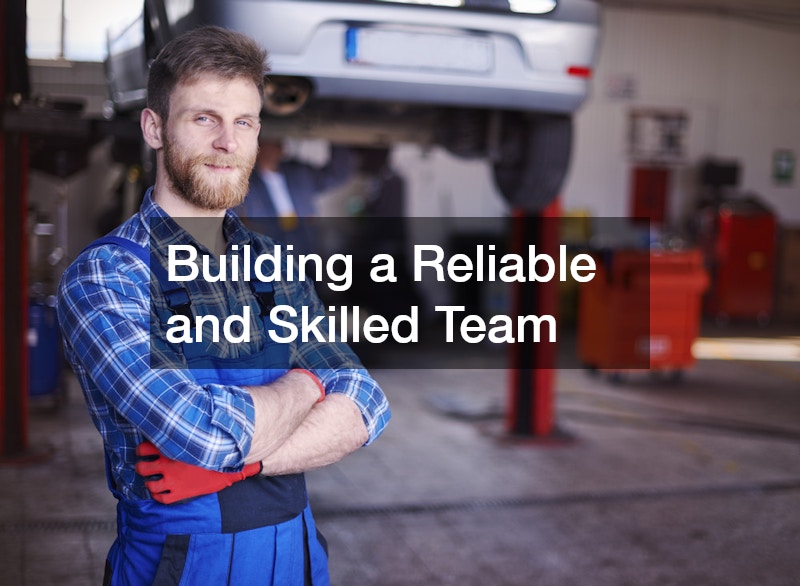Starting an auto-related business can be an incredibly rewarding endeavor, but the first big challenge is identifying the perfect niche. There are countless opportunities—from traditional auto maintenance shops and specialized auto body shops, to offering heavy duty towing or even niche services like semi towing service or semi clutch repair. Deciding what will set you apart from the competition is critical.
Begin by considering your personal interests, skills, and experience. Are you more passionate about cars, trucks, or commercial vehicles? Do you have experience working on complex drivetrains, handling bodywork and paint, or managing logistics for large fleet operators? If you’ve spent years working on cars, launching a general auto maintenance garage might feel natural. On the other hand, if you have experience handling large vehicles, you might lean toward a specialized semi clutch repair or heavy duty towing service catering to trucking companies.
Market research is another vital part of finding your niche. Examine local demand—maybe there’s a shortage of reputable auto body shops in your area, or perhaps long-haul truckers passing through your town are constantly searching for a reliable semi towing service. By identifying unmet needs, you can tailor your business to fill gaps and address pain points in the market. Remember, the goal is to offer something your competitors don’t—whether that’s better pricing, specialized expertise, or a convenient mobile service.
It’s also wise to think about how to differentiate yourself through branding, customer service, and technology. Maybe you operate out of a mobile truck that can assist stranded vehicles on remote highways, or perhaps you partner with other local businesses, like commercial HVAC services contractors or an it services provider, to streamline your operation. Your niche doesn’t have to be overly complicated, but it should represent a genuine value proposition that resonates with your target customers.
Planning and Structuring Your Business

Once you have identified your niche, it’s time to create a thorough business plan and structure your company effectively. This involves everything from defining your mission statement to outlining your financial projections. Consider the organizational model you’ll use—will you run a small shop on your own, partner with others, or form a corporation that can attract investors and scale over time? How you structure your business can have long-term implications for taxes, liability, and growth potential.
Conduct a detailed cost analysis. If you’re planning to provide heavy duty towing or semi towing service, for example, factor in the cost of purchasing and maintaining appropriate towing vehicles and equipment. Likewise, if you’re starting auto body shops, plan for expenses related to painting equipment, welding tools, and hazardous waste disposal. Don’t forget the hidden costs, such as insurance, licensing fees, and compliance with local regulations.
A critical aspect of planning also involves forecasting revenue. Estimate the average number of customers per month, the prices you’ll charge, and how those revenues will cover your expenses. Planning realistically helps you avoid overspending and reduces the risk of cash flow problems early on. You might also consider forming strategic partnerships—aligning with dumpster rental services can help you manage waste efficiently, or contracting with an it services provider can streamline billing and scheduling systems.
Finally, focus on building relationships with reliable suppliers. If you specialize in auto maintenance, you’ll need a steady flow of high-quality parts. If you’re in semi clutch repair, having a reliable distributor for specialized parts is essential. Identifying and securing these relationships during the planning phase lays the groundwork for smooth operations once you open your doors.
Financing Your Venture

Starting an auto-related business often requires a significant initial investment. Whether you’re opening a traditional shop offering routine auto maintenance or a specialized facility performing heavy duty towing, you’ll likely need capital to purchase equipment, secure a location, and hire staff. Consider various financing options, including bank loans, Small Business Administration (SBA) loans, investors, or even crowdfunding campaigns. The right financing strategy depends on your credit history, industry experience, and long-term business goals.
It’s advisable to prepare a solid business plan before approaching lenders or investors. Demonstrating that you’ve identified a profitable niche—like providing an all-in-one solution that combines semi towing service with other specialized offerings—will help convince potential financiers that your business is viable. Be ready to show financial projections, market analysis, and how you plan to differentiate yourself.
Keep detailed records from day one. Hiring professional bookkeepers can save you time and energy, ensuring you maintain accurate financial statements. Proper bookkeeping is crucial not just for tax season, but also for making informed decisions about investments, pricing, and staffing. Good financial management will help you adapt to market changes, identify profitable segments, and manage any unforeseen expenses that may arise during your business’s growth phase.
Selecting the Right Location and Facilities
Location can make or break many auto-related businesses. If you’re opening auto body shops or providing auto maintenance, consider a place close to main roads, highways, or neighborhoods with high vehicle ownership. For specialized services like semi towing service or semi clutch repair, you’ll want to be easily accessible to trucking routes or freight corridors. Visibility, accessibility, and zoning regulations all matter.
If you plan to scale up and handle large vehicles, ensure your chosen property can accommodate bigger machines and has sufficient space for towing trucks or large service bays. Storage space is also vital—if you partner with dumpster rental services, for example, you’ll need adequate room to handle waste disposal efficiently. Adequate room for parking, waiting areas, and office spaces are other considerations to keep in mind.
Don’t forget about building infrastructure and maintenance. You might need reliable commercial HVAC services to keep your workspace comfortable and functional year-round. A well-ventilated, climate-controlled environment is especially important for tasks like painting or working with chemicals. Proper lighting, drainage, and waste disposal systems will help you maintain safety standards and comply with local environmental regulations.
Lastly, if you plan to incorporate technology—like using a business voip system for phone calls, or software from an it services provider—ensure the location has reliable internet connectivity and sufficient electrical capacity. This preparation ensures that your business can grow with minimal logistical hurdles down the line.
Building a Reliable and Skilled Team

No matter how much experience you personally bring, success often hinges on the team you assemble. Skilled technicians, mechanics, and administrative staff are the backbone of operations for auto maintenance facilities, auto body shops, and towing services alike. You need employees who are knowledgeable, reliable, and committed to excellent customer service.
When hiring mechanics, consider their specialization. If you’re focusing on heavy duty towing or semi clutch repair, ensure they have experience working on large commercial vehicles. Ongoing training can keep your team updated on the latest tools, diagnostic equipment, and service techniques. Skilled workers are also more efficient, helping you maintain faster turnaround times and higher customer satisfaction rates.
Don’t overlook the importance of administrative staff. Competent service advisors, receptionists, or office managers can streamline scheduling, handle billing, and improve communication with customers. Bookkeepers are equally crucial, as they’ll keep your financial records organized, ensure you’re meeting tax obligations, and help track expenses, revenue, and profitability. Investing in a well-rounded team that covers both the hands-on and behind-the-scenes aspects of the business sets the stage for long-term stability and growth.
Investing in the Right Equipment and Tools
The right tools not only enhance efficiency, but also ensure you can deliver the quality your customers expect. If your focus is on auto body shops, invest in top-notch paint booths, frame straighteners, and welding equipment. For auto maintenance shops, high-quality lifts, diagnostic tools, and tire-changing machines are essential. In heavy duty towing or semi towing service operations, powerful tow trucks, hydraulic lifts, and specialized winches are the mainstays of your service.
Don’t cut corners when purchasing equipment. Cheap or second-hand gear might save money up front but often ends up costing more in repairs and downtime. It’s also beneficial to maintain relationships with trusted suppliers and contractors. For example, if you’re working with an it services provider, ensure they understand the specific software and hardware needs of the automotive industry, from inventory management systems to digital diagnostic tools. Similarly, if you require semi clutch repair kits, source them from reputable manufacturers known for durability and reliability.
Regular maintenance is key. Treat your equipment like you would a customer’s vehicle. Schedule routine checks, replace worn parts, and ensure all tools meet safety standards. This diligence enhances both productivity and your reputation for reliability—customers appreciate working with a business that invests in quality and well-maintained tools.
Establishing a Professional Image and Brand
Branding goes beyond a catchy name or a slick logo. Your brand represents who you are, what you do, and why customers should trust you. From your choice of location and the appearance of your shop to the uniforms your team wears, every detail contributes to the overall impression.
Think carefully about what you want your brand to communicate. If you’re focusing on semi clutch repair and heavy duty towing, position yourself as a dependable partner for truckers and fleet managers. If you run auto maintenance or auto body shops, emphasize your commitment to quality craftsmanship, transparency, and timely service. Your online presence should mirror these values—use a professional website, social media, and digital marketing to share informative content, customer testimonials, and clear pricing structures.
Don’t forget about communication tools, like business voip systems, which can streamline customer calls, reduce wait times, and provide professional greetings or automated menus. Consistency in every customer interaction—whether in-person, on the phone, or online—is crucial. Over time, a strong, consistent brand helps build loyalty and encourages word-of-mouth referrals, one of the best ways to grow your customer base.
Managing Waste and Environmental Responsibility
Environmental responsibility is becoming increasingly important in the automotive industry. Customers appreciate businesses that take steps to minimize their ecological impact. Whether you run auto body shops, handle semi clutch repair, or offer heavy duty towing, you’ll likely generate waste—old parts, oil, paint solvents, and scrap metal can accumulate quickly. Partnering with dumpster rental services can help you manage waste efficiently and comply with local regulations.
Safe disposal of hazardous materials isn’t just about following the law, it’s about protecting your team, customers, and the community. Invest in proper storage solutions, training staff on handling chemicals, and implementing recycling programs where possible. Highlight your eco-conscious efforts in your marketing—environmentally responsible businesses can attract customers who prioritize sustainability.
Some customers will also value energy-efficient operations and greener options. By working with commercial HVAC services to ensure your heating and cooling systems are efficient, you reduce energy costs and environmental footprint. Implementing LED lighting, proper insulation, and recycling automotive fluids or batteries are additional steps that demonstrate your commitment to running a responsible, future-minded business.
Leveraging Technology for Efficiency

Technology can provide a significant competitive advantage. Scheduling software, inventory management systems, and online invoicing solutions streamline operations and free up time for more value-added tasks. An it services provider can help you choose and set up the right platforms for your business model, whether you run a mobile semi towing service or a stationary auto maintenance facility.
Digital diagnostic tools enable mechanics to quickly identify issues and perform efficient repairs. Online marketing platforms help you reach new customers through search engine optimization, pay-per-click ads, or social media campaigns. Tools like business voip not only enhance customer communication but can also integrate with your CRM or booking system for a smooth, centralized experience.
Be open to innovation. As the automotive industry evolves—embracing hybrid vehicles, electric drivetrains, and autonomous technologies—you may need to adapt. Regularly review emerging tools and techniques to stay ahead of the curve. Encouraging continuous learning and technical training among your team helps future-proof your business, making it more resilient to changes in consumer demands and industry standards.
Pricing Your Services Competitively and Fairly
Pricing can be a delicate balancing act. Too high and you risk scaring away potential customers; too low and you might struggle to cover costs. Start by researching your competition. Understand what local auto body shops charge, what it costs for heavy duty towing or semi towing service in your area, and the going rate for general auto maintenance. Consider factors such as the complexity of the job, the cost of materials, labor time, and overhead expenses.
Your pricing strategy can also communicate value. Customers don’t always opt for the cheapest option. Many are willing to pay more for superior workmanship, guaranteed parts, or exceptional customer service. Be transparent—provide detailed estimates, explain why quality parts cost more, and highlight the warranties you offer.
Don’t hesitate to adjust your prices as your reputation grows or as market conditions change. If your business becomes known as the go-to place for semi clutch repair or specialized towing services, you may justify higher rates due to your expertise and reliability. Just ensure any price adjustments are well-communicated and accompanied by an explanation of the benefits to the customer.
Marketing and Promoting Your Business
Attracting customers requires both online and offline marketing strategies. Traditional methods—like flyers, local newspaper ads, or attending community events—can still be effective, especially if your target demographic isn’t exclusively digital. However, an online presence is increasingly essential. A professional website, optimized for search engines, ensures that people can find you when they search for auto maintenance, auto body shops, or heavy duty towing services in their area.
Social media can be a powerful tool. Use platforms like Facebook, Instagram, or LinkedIn to share success stories, before-and-after photos, helpful maintenance tips, and promotions. Offering discounts to first-time customers or referral bonuses can encourage current clients to spread the word. Consider producing educational content—how-to guides, videos, or blog posts—to position yourself as an authority in your niche.
Don’t forget the value of customer reviews. Encourage satisfied clients to leave feedback on Google Maps, Yelp, or other review platforms. Positive reviews build trust, making new customers more likely to choose you over competitors. Prompt, professional responses to both praise and criticism show that you value your clients and are dedicated to continuous improvement.
Maintaining Compliance and Industry Standards
In the automotive industry, regulations and standards are a reality. Compliance is non-negotiable if you want to maintain your reputation and avoid legal troubles. Familiarize yourself with local, state, and federal laws that apply to your operations. This could include environmental regulations for handling chemicals, licensing requirements for towing services, or safety protocols in your shop.
If you handle large vehicles, semi towing service, or heavy duty towing, make sure your drivers have the proper licenses and your equipment meets Department of Transportation standards. If your focus is on auto body shops, ensure you follow hazardous waste disposal rules and have the correct permits for painting and emissions. Working with industry associations, attending workshops, and hiring consultants can help you stay up to date with evolving regulations.
Adhering to industry standards goes hand in hand with quality assurance. Customers notice when a business is well-organized, follows protocols, and puts safety first. Emphasizing compliance not only protects you legally but also enhances your credibility, reassuring clients that you operate ethically and professionally.
Staying Informed and Continuously Improving
The automotive industry is dynamic. New technologies, standards, and customer expectations evolve constantly. Staying informed and committed to improvement is crucial for long-term success. Attend industry conferences, workshops, and training sessions. Subscribe to industry publications and follow thought leaders online. Encourage your staff to upgrade their skills, perhaps through certification courses or manufacturer-sponsored training.
Regularly review your business operations. Are your inventory management systems up to date? Are customers satisfied with your pricing and turnaround times? Could you benefit from a different it services provider or better business voip infrastructure? Periodic evaluations help you identify inefficiencies, spot emerging trends, and adapt before competitors do.
Innovation isn’t just about technology. It can also mean offering unique services—such as providing after-hours emergency towing, or a concierge-style approach where customers can schedule appointments online and receive text updates. Embrace feedback from both customers and employees. Your front-line staff often has valuable insights into what’s working and what needs improvement. By continually striving to do better, you keep your business relevant, profitable, and appealing.
Starting your own auto-related business can feel like stepping onto a dynamic, competitive highway. The journey is filled with twists and turns—finding the right niche, securing financing, choosing a strategic location, and hiring skilled employees. Along the way, you’ll need to forge relationships with suppliers, it services providers, and partner businesses that can complement and enhance your offerings. You may integrate services like business voip to streamline communication or partner with dumpster rental services to manage waste efficiently.
No single formula guarantees success. It’s about balancing a range of factors: offering consistent quality, delivering outstanding customer service, maintaining compliance, leveraging technology, and strategically expanding over time. Whether you’re running auto maintenance operations, exploring new markets like heavy duty towing, or specializing in niche areas like semi clutch repair, adaptability and attention to detail matter.
As you embark on this new venture, keep learning and refining your approach. Surround yourself with skilled professionals—bookkeepers to maintain clear financials, commercial HVAC services contractors to ensure a comfortable workspace, and reliable suppliers who provide quality parts on time. Each piece of the puzzle contributes to a well-rounded, resilient business.
In the end, success in the auto industry often comes down to trust and relationships. Customers need to know they can rely on you to provide honest advice, fair pricing, and skilled workmanship. By focusing on delivering value, nurturing your brand, and continually improving your operations, you’ll have every opportunity to steer your auto-related business toward a prosperous, sustainable future.


